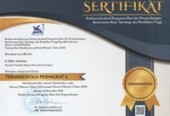Unilateral Claim in Dispute of Island Over the South China Sea
Abstract
In the unilateral claim, every determination of a territory is the right of a sovereign state and does not require agreement with international organizations or other countries. Especially regarding the borders of a country, many international regulations require a joint determination (bilateral or multilateral). The norm will impact the absence of responses from another country, or such a country does not react because its interests were not disturbed. China's unilateral statement over the South China Sea has tried to dominate globally, and at the same time, there has been no stabilization of peace. It will likely continue, expand, and have long-term adverse impacts on the regional economic and security situation in the region. China's unilateral claims in the South China Sea have also resulted in other warring countries, strengthening their presence and claims. This research uses normative approach which examines the unilateral claims under international law in the South China Sea especially in the UNCLOS 1982 and other related international law instruments. As a result, for China, it is necessary to improve its current position, at least it needs to negotiate in the future. Countries which is involved in the South China Sea should clarify and submit territorial claims and maritime rights under international law, including the UNCLOS 1982.
Keywords
Full Text:
PDFReferences
Agusman, Damos Sumoli. “Indonesia Dan Hukum Internasional: Dinamika Posisi Indonesia Terhadap Hukum Internasional.” Jurnal Opinion Juris 15, no. Januari-April (2014): 15–16.
Chang, Teh-Kuang. “China ’s Claim of Sovereignty over Spratly and Paracel Islands: A Historical and Legal Perspective.” Case Western Reserve Journal of International Law 23, no. 3 (1991): 399.
Chi, Kuo-hsing. The Spratlys Disputes and Prospects for Settlement/Ji Guoxing. Kuala Lumpur, Malaysia: Institute of Strategic and International Studies, 1992.
Grinius, Marius. South China Sea and the New Great Game. Canadian Global Affairs Institute, 2016.
Hong, Nong. UNCLOS and Ocean Dispute Settlement: Law and Politics in the South China Sea. USA and Canada: Routledge is an imprint of the Taylor & Francis Group, 2012.
Ishii, Yurika. “International Territorial Disputes And Confrontations In The South China Sea From A Legal Perspective.” In The 18th Japan-EU Conference, Standards, Governance and the Rule of Law: Opportunities for EU-Japan Cooperation. Brussel, 2015.
Jenne, Nicole. “Managing Territorial Disputes in Southeast Asia: Is There More than the South China Sea?” Journal of Current Southeast Asian Affairs 36, no. 3 (2017): 35–61.
Kurniawan, Aris. “Pengertian Hubungan Bilateral, Multilateral Dan Unilateral Beserta Contohnya.” Gurupendidikan.com, 2019. http://www.gurupendidikan.co.id/pengertian-hubungan-bilateral-multilateral-dan-unilateral-beserta-contohnya/.
Larry W. Coker, JR. The Spratly Islands Dispute: Can ASEAN Provide the Framework For A Solution? U.S. Army War College Carlisle Barracks, Pennsylvania, 1996.
Linebaugh, Christopher. “Joint Development in a Semi-Enclosed Sea: China’s Duty to Cooperate in Developing the Natural Resources of the South China Sea.” Columbia Journal Of Transnational Law, 52, no. 2 (2014): 542–46.
Lo, Chi-kin. “China’s Policy Towards Territorial Disputes: The Case of the South China Sea Islands.” Etudes Internationales 22, no. 3 (1991).
Mahendra, Arief Bakhtiar Darmawan & Lady. “Isu Laut Tiongkok Selatan: Negara-Negara ASEAN Terbelah Menghadapi Tiongkok.” Global & Strategis 12, no. 1 (2018): 79–85. https://e-journal.unair.ac.id/JGS/issue/view/735.
Mark J. Valencia, Jon M. Van Dyke and Noel A. Ludwig. Sharing the Resources of the SCS, Martinus Nijhoff Publishers, 1997), Hlm. 21; Lihat Juga: Hong, Nong, UNCLOS and Ocean Dispute Settlement: Law and Politics in the South China Sea. Routledge. Abingdon. Oxon [UK], 2012.
Quintos, Mary Fides A. “Artificial Islands in the South China Sea and Their Impact on Regional (In)Security.” FSI Insight II, no. 2 (2015): 1. http://www.fsi.gov.ph/wp-content/uploads/2015/03/2015-0305-Vol-2-No-2-FSI-Insights-Artificial-Islands-in-the-South-China-Sea-Quintos.pdf.
Sukma, Hasjim Djalal dalam Asnani Usman dan Rizal. Konflik Laut China Selatan Tantangan Bagi ASEAN. Jakarta: Center For Strategic and International Studies, 1997.
Sun, Yun. “China’s New Calculations in the South China Sea.” Asia Pacific Bulletin, 2014. https://www.eastwestcenter.org/sites/default/files/private/apb_267_0.pdf
Tuan, Hoang Anh. “Chinese Strategic Miscalculations in the South China Sea.” Asia Pacific Bulletin, 2012. https://www.eastwestcenter.org/sites/default/files/private/apb_181.pdf.
Usman, Asnani, and Rizal Sukma. Konflik Laut China Selatan Tantangan Bagi ASEAN. Jakarta: Center For Strategic and International Studies, 1997.
Weingerl, Ales. “Definition of Unilateral Acts of States,” n.d. http://www.esil-sedi.eu/sites/default/files/Weingerl_0.PDF.
Yakin, A. Legal Research and Writing. Lexis Nexis, Kelana Jaya, 1992.
Zahraa, Mahdi. Research Methods for Law Postgraduate Overseas Student. Stiglow Sdn. Bhd. Kuala Lumpur, 1998.
DOI: http://dx.doi.org/10.28946/slrev.Vol4.Iss2.221.pp1-8
Refbacks
- There are currently no refbacks.

Sriwijaya Law Review (SLRev) ISSN: 2541-5298 | e-ISSN: 2541-6464 is licensed under a Creative Commons Attribution-ShareAlike 4.0 International License.






















